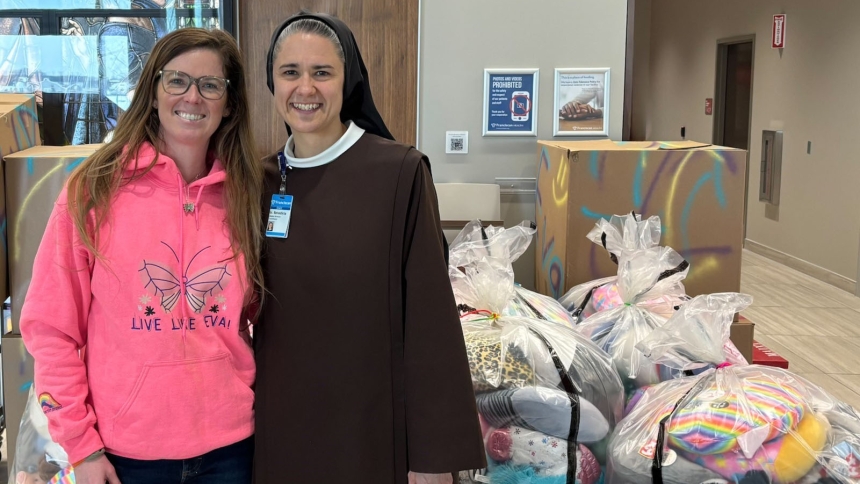
As published in the Northwest Indiana Catholic on October 21, 2017
This Sunday, Oct. 22, is the feast day of Saint John Paul II, marking his inauguration Mass in St. Peter’s Square when he received the pallium, beginning his 26 years of pastoral ministry to the universal Church. His words, example, teaching and presence deeply impacted my life, contributing greatly to my vocational discernment, priestly formation and service to Christ and his people. I find it hard to believe that 39 years have passed since John Paul emerged on the global scene; his legacy of faith, courage, love and joy endures in so many ways.
In his homily on Oct. 22, 1978, the pope incisively proclaimed to the whole world, “Do not be afraid to welcome Christ and to accept his power! Do not be afraid! Open the doors for Christ! To his saving power, open the borders of nations, economic systems, political systems, the vast fields of culture, of civilization, of development.”
These challenging words and John Paul’s subsequent courageous actions helped bring down the brutal atheistic regimes of communism, beginning in his native Poland. By announcing the Gospel of Christ and articulating the fundamental human rights that belong to each person as a child of God, the pope became a powerful global force for political freedom for the oppressed and economic liberation for the poor.
After papal visits, the people of the Philippines peacefully overthrew the dictatorship of the Marcos regime and Haiti rose successfully against the brutality of the Duvaliers. While the Gospel of Christ is not inherently political, it certainly has political and economic implications for the proper, just and merciful ordering of every human society.
This year also marks the 25th anniversary of the issue of the Catechism of the Catholic Church, the first universal catechism to comprehensively explain the faith since the Council of Trent. Currently, a few hundred people in our diocese are studying the catechism in both English and Spanish. In leading the English gathering, I have found the participants hungry to know the faith, completely engaged and asking deep questions.
The catechism begins with the human experience of the infinite, the revelation of God to us and our response of faith to this divine initiative. Divided in four sections, it details the fundamentals of Catholic belief regarding the Creed, the sacraments, the moral life and prayer. Quoting Scripture, the writings of the saints and papal documents, the catechism is a gifted guide for us to truly know and treasure the basics of our Catholicism. This book is part of Saint John Paul’s legacy.
In his encyclical, “Evangelium Vitae,” Pope John Paul laid out the beautiful vision of the human person, made in the image and likeness of God and named the fundamental threats to life today, especially abortion, assisted suicide and euthanasia. In a modern culture that values youth, productivity and strength, the elderly, the ill, the poor and the marginalized seem to be burdens and obstacles. The pope called all believers and people of good will to build a culture of life and a civilization of love in which every human being receives life, nurture, love and acceptance. In our increasingly violent and deadly culture, these teachings, articulated in 1995, are both prophetic and necessary for our lived faith today.
The pope wrote profoundly learned encyclicals and exhortations on a myriad of topics, from the Holy Spirit to moral theology, from the necessary of faith and reason to the redemptive nature of suffering, from the spiritual meaning of human labor to the urgency of social justice to the importance of Sunday as the day of the Lord. Fusing fundamental philosophic principles, a theology rooted in Scripture and the Church Fathers and a clear vision of both the lights and shadows of the modern world, John Paul’s writings will remain as an illuminating spiritual and moral guide into the future.
Pope John Paul created the whole phenomenon of World Youth Day - epic gatherings of millions of Catholic youth every few years in a different country. Although the naysayers fretted that such a massive undertaking would never work, the pope proved them all wrong. Through prayer, catechesis, service and celebration, culminating in a papal Mass on the last day, World Youth Days ignited the minds and hearts of generations of young Catholics in a fresh commitment to follow Christ as missionary disciples. The next one will be in Panama in 2019.
Pope John Paul brought Catholicism to the world, visiting hundreds of countries, internationalizing the Curia and the College of Cardinals, holding special synods for every continent, articulating the vision of the new evangelization, bolding speaking liberating truth to repressive political regimes, canonizing saints from new countries, and in 26 years of intense, challenging labor for the Gospel, joyfully lifting up Jesus Christ as the redeemer of the world and the prototype of the human person fully alive.
When Saint John Paul II died on April 2, 2005, I wrote a letter to him, in which I said, “Thank you for your joy, your smile, your incredible love for the Church, your ecumenical gestures, the saints you have held up for us, your tender devotion to the Blessed Virgin, your love for language and poetry, your passion for nature and sports, your courage in the face of constant death threats, your fidelity to the task at hand until the moment of death, your gracious example of how to age, suffer and surrender all into the merciful heart of Christ.”
As we celebrate your feast and legacy, pray for us, Saint John Paull!
+ Donald J. Hying


